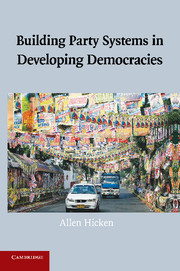Description
Building Party Systems in Developing Democracies
Author: Hicken Allen
Hicken analyzes the formation of nationally oriented political parties in democracies and its variation across countries using a theory of aggregation incentives.
Language: English
Subject for Building Party Systems in Developing Democracies:
Approximative price 32.87 €
In Print (Delivery period: 14 days).
Add to cart
Building Party Systems in Developing Democracies
Publication date: 08-2014
Support: Print on demand
Publication date: 08-2014
Support: Print on demand
Approximative price 76.05 €
Subject to availability at the publisher.
Add to cart
Building party systems in developing democracies
Publication date: 01-2009
224 p. · 15.2x22.9 cm
Publication date: 01-2009
224 p. · 15.2x22.9 cm
Description
/li>Contents
/li>Biography
/li>
This book addresses the question of why a party system with a modest number of nationally oriented political parties emerges in some democracies but not others. The number of parties and nationalization are the product of coordination between voters, candidates, and party leaders within local electoral districts and coordination among candidates and elites across districts. Candidates and voters can do and do coordinate locally in response to electoral incentives, but coordination across districts, or aggregation, often fails in developing democracies. A key contribution of this book is the development and testing of a theory of aggregation incentives that focuses on the payoff to being a large party and the probability of capturing that payoff. The book relies on in-depth case studies of Thailand and the Philippines, and on large-n analysis to establish its arguments.
1. Introduction; 2. A theory of aggregation incentives; 3. Testing the theory; 4. Aggregation, nationalization, and the number of parties in Thailand; 5. Explaining aggregation in Thailand; 6. Term limits, aggregation incentives, and the number of parties in the Philippines; 7. Conclusion.
Allen Hicken is an Assistant Professor of Political Science, Faculty Associate at the Center for Southeast Asian Studies, and Faculty Associate at the Center for Political Studies at the University of Michigan. He studies elections, parties, and party systems in developing democracies, with a particular focus on Southeast Asia. He has carried out research and held research positions in Thailand, the Philippines, Singapore, and Cambodia. He is the recipient of a Fulbright Award and, along with Ken Kollman, an NSF grant. His publications include articles in the American Journal of Political Science, the Journal of Politics, Electoral Studies, the Journal of East Asian Studies, and the Taiwan Journal of Democracy.
© 2024 LAVOISIER S.A.S.




